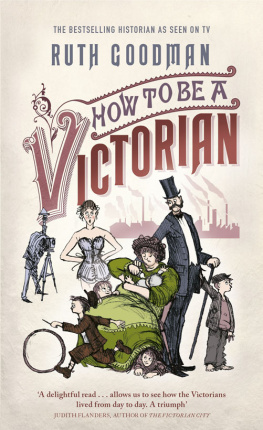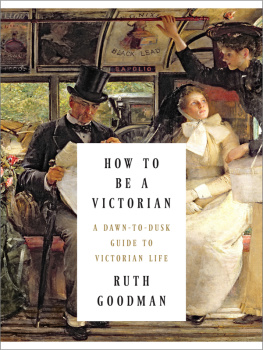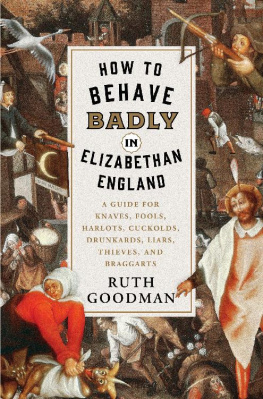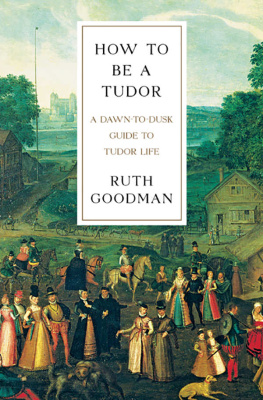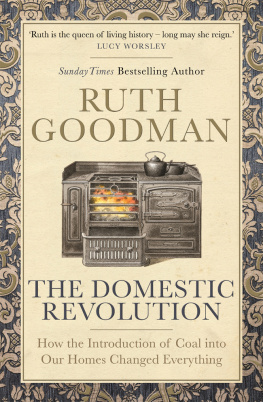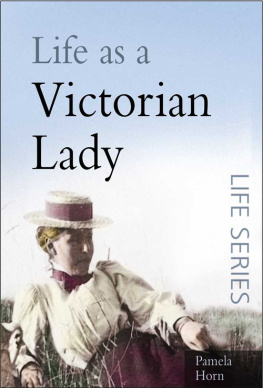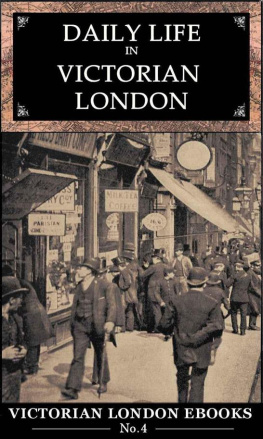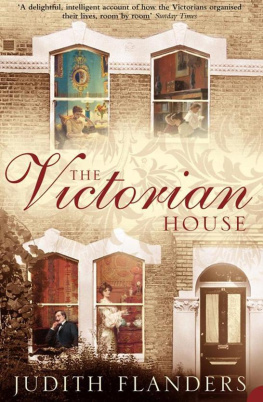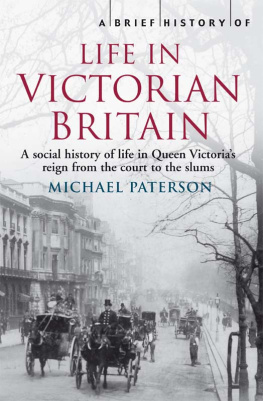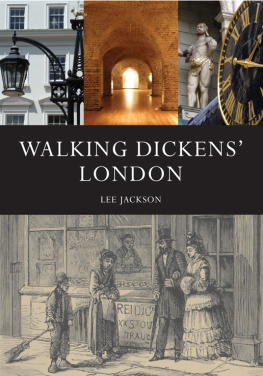Acknowledgements
This book would not have been possiblewithout the help, and work, of a great many people. In particular, I should like tothank all those people who have shared with me, and made possible, the practicalexperiments into Victorian living that have so expanded my interest andunderstanding. To Peter, Alex, Stuart, Naomi, Felicia, Chris, Guilia, Tim, David,Nick and Tom, thank you for all the support and encouragement when we were stood inthe freezing rain, for sympathy when the parsnip allergy raised those terribleblisters, for rescuing me when I set myself on fire, and in all those other momentsof doubt. Thanks also to my parents, Geoff and Claire, and to Joan and Shona, whogave me the basic grounding in the practical matters of life, the skills that makeVictorian living possible.
The biggest debt, of course, is to thoseVictorian people who left behind their opinions, thoughts, instructions and memoriesin written form, whose work left us the objects that help us to untangle somethingabout their lives. Whatever their varied motives were in recording contemporarylife, I am deeply grateful to the diarists Hannah Cullwick, Francis Kilvert, JohnCastle; those who wrote and kept their letters, such as Jane Carlyle; people such asStephen Reynolds, who documented family life at the Widger household; toautobiographers such as Frederick Hobley, Alice Foley, Joseph Bell, Jack Lannigan,John Finney, William Arnold, Joseph Arch, Alfred Ireson, James Bonwick, AlbertGoodwin, Kate Taylor, Fred Boughton, Faith Osgerby, Joseph Asby, George Bickers,Joseph Terry, James Carter, Mary Marshall, Thomas Cooper, Daniel Chater, Joseph Burgess, James Hopkinson, Marianne Farningham, Charles Shaw,Robert Blincoe, James Saunders, Israel Roberts, John Bezer, Ernest Shotton, WilliamWright, Roger Langdon, Ben Brierley, Louise Jermy, William Chadwick, Robert Collyer,George Mockford and Francis Crittall.
While the journalist Henry Mayhew standsout in his description of real Victorian lives among his professional peers, thewriters of a host of newspapers, journals and magazines have proved invaluable, andI have been able to mine the vast resources of publications including:Illustrated London News, Illustrated News, The Times,Daily Telegraph, The Morning Chronicle, The FamilyHerald, The Quiver, The Boys Own Paper, TheGirls Own Paper, The Christian, Household Words,The Englishwomans Domestic Magazine, The Young LadiesJournal, Baileys Magazine, Gardening Magazine,The Windsor Magazine, Cassells Household Magazine,The Ladies Cabinet, Bells Life, AthleticNews, Manchester Guardian, Good Words, Sunday atHome, The Woman at Home, Macmillan Magazine andSports Argus.
I have much reason to be thankful to theVictorian writers of advice books and manuals for their help in unpicking theprevailing ideas, etiquette and practical know-how of the period. EnquireWithin was the blockbuster that outsold all others; first published in1856, over half a million copies had been sold by 1878. It spawned a host ofspin-offs and copycat publications, all of which I have found as useful as theoriginal. The medical works of Drs Pye Chevasse, William Acton, Thomas Ball,Archibald Donald, Mary Wood Allen, Sylvanus Stall, John McGregory Robertson, GeorgeNaphys, Elizabeth Blacklock, all primarily aimed at a lay audience, were packed withuseful information, while writers such as William Cobbett, Edith Barnett, DonaldWalker, Florence Nightingale, George Frederick Pardon, Harvey Newcomb, MaryHalliday, Eliza Acton, Mrs Rundell and Mrs Beeton offered insights into other areasof life.
In the twenty-first century, I am indebtedto a host of historians, such as Helen Rogers, Pamela Horn, Patricia Branca, JaneHumphries, Wally Seccombe, Matt Cook, K. D. M. Snell, Paul Ell, John Tosh, DennisBrailsford, Simon Inglis, Barry Reay, Patricia Malcolmson, Neil Storey, Peter Hodge,Sue Wilkes, Norman Longmate, Iona and Peter Opie, Kathryn Gleadle, Adam Kuper, JuliaLaite, John Burnett, Anne Brogden, Ginger Frost, Fergus Linnane, Clare Rose,Christina Walkley, Vanda Foster, Hugh McLeod, C. Anne Wilson, John Harcup, DeborahLutz, Janet Arnold, Rachel Worth, Deirdre Murphy, J. Honey and Valerie Saunders, fortheir enlightening and inspirational works, and to the team at Penguin, especiallyBen, who have had such an important role to play in shaping this book.
Lastly, but most personally, to Mark andEve, without whom I could simply not breathe.
By the same author
Victorian Farm with AlexLanglands & Peter Ginn
Edwardian Farm with AlexLanglands & Peter Ginn
Wartime Farm with Alex Langlands& Peter Ginn
1. Getting Up
It began with a shiver. Rich or poor, incity dwelling or farm labourers cottage, the first step out of bed was likelyto leave you cold. The wealthier classes often had coal fireplaces and iron gratesin their bedrooms, but these were rarely lit. Jane Carlyle, the wife of Scottishessayist Thomas Carlyle, lived in a fashionable London town house in the 1850s (). Despite her familysincome, fires were only prepared upstairs at desperate times, when bedrooms wereused by the sick. Once, when a fire was indeed lit for her at a wealthyfriends home, she described it as a wanton luxury, one thatmade her feel quite guilty about her own robust good health.
For Jane Carlyle, the day began ataround 7.30 a.m., but her servant would have been up much earlier than that. MrsBeetons Book of Household Management recommends that a housemaidshould begin her work at 6 a.m. in the summer and 6.30 or 7 a.m. in the winter,reflecting the amount of available daylight. Hannah Cullwick was a woman who workedin domestic service her entire life. For many years, she kept a diary recording herdaily working routine. In her neat blue handwriting she writes that she usually wokeat six, although if there was extra work to be done it could be much earlier. Springcleaning, as the days lengthened, generally entailed a 5 a.m. start, but there wasalso the occasional lie-in. On Christmas Day in 1863 she stayed in bed until aluxurious eight oclock. Each morning, she would light the fires, shake outthe carpet, polish the dining-room furniture, eat her own breakfast, clean a pair ofboots and scrub the front steps before her employers family woke up.
Dawn was the signal for most working peopleto rise, but many men had more fixed hours of waking. For those who had to keep veryearly hours and be punctual, such as factory workers, the services of aknocker-upper were invaluable. Armed with a long cane and a lantern, aknocker-upper wandered the streets at all hours, tapping on the windowpanes of hisclients. One of the reasons for his unusual profession was that clocks and watcheswere expensive items and few working-class people could afford their own. For theknocker-upper, however, a capital investment in a timepiece could provide the basisof a meagre livelihood. He worked through the night and into the early morning, eachof his numerous customers paying a penny a month for his services. Such men could befound in industrial towns and cities across Britain from Portsmouth to Inverness,even extending to smaller market towns such as Baldock in Hertfordshire, where oneof the three local breweries employed a man to wake their draymen at 3 a.m. With apopulation of only two thousand, Baldock still had a sufficient number ofearly-morning workers on the railway, in the brewing industry and at a host of smallworkshops to keep a knocker-upper in employment.

